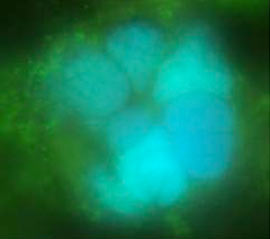
Micrograph courtesy Mike S. Jetten, Radboud Univ.
The deep sediments and oxygen minimum zones of the world’s oceans are assumed to be responsible for the majority of nitrogen loss on earth. The microbes responsible for the nitrogen loss were long unknown, but compelling evidence is now accumulating that marine anaerobic ammonium oxidizing (anammox) bacteria are responsible, making them very important players in the global nitrogen cycle. In marine ecosystems, the carbon and nitrogen cycles are closely connected. More knowledge of the regulation and mechanism of CO2 sequestration by anammox bacteria in the ocean will contribute to our understanding of the global biogeochemical cycles and their impact on climate change.
Anammox bacteria are also able to synthesize the rocket fuel hydrazine from ammonia and hydroxylamine in millimolar quantities without any optimization. Insight into the genes and proteins involved in this reaction may enable heterologous expression and further optimization of the production of this potent fuel in a suitable biological system. In addition to hydrazine production, anammox bacteria can also convert hydrazine anaerobically to ammonium and dinitrogen gas. This property could be exploited in bioremediation of hydrazine spills from nuclear power plants and air force bases. Finally, anammox bacteria have been successfully employed to treat highly loaded wastewater in industrial and municipal waste water treatment systems. The application of anammox bacteria could be further improved by optimizing such reactor systems through the use of genomics-based microarrays to monitor gene expression under various environmental conditions relevant to wastewater practice (shock loads, periods of starvation, oxygen inhibition).
Because anammox bacteria have long generation times (2-3 weeks), physiological and biochemical studies are an inefficent means to unravel their full potential and metabolic properties. The genome sequence of these new anammox bacteria is expected to reveal how the bacteria encode many of their unique ‘anammox’ properties. The new data sets will also be very valuable to fine-tune the evolutionary aspects of the Planctomycetes – Verrucomicrobium – Chlamydiae superphylum as more genomes become available.
Principal Investigator: Mike S. Jetten (Radboud Univ.)